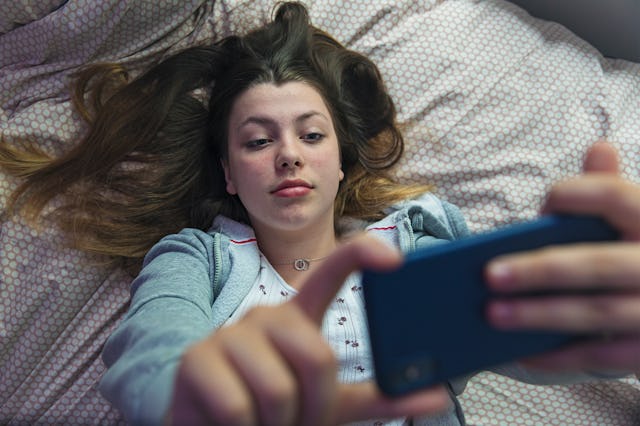Teaching My Daughter That Most Of What She Sees Online Isn’t Real Feels Impossible
It got to be a real concern way faster than I ever anticipated.

My daughter was 12 when she got her first cell phone. In hindsight, neither one of us was ready. While I was on social media myself, I was mostly following home decor pages on Instagram. I had no idea what else was out there. I didn’t understand just how easy it had gotten for content creators to totally alter their appearance online using filters, without any sort of disclosure. And I was not prepared for the impact that would have on my teenage daughter.
Keep in mind this was seven years ago, and filters weren’t as widely used as they are today. But since I didn’t follow many influencers or consume the same stuff my daughter would, I wasn’t seeing the entire picture.
At first, she preferred Snapchat over Instagram, and TikTok wasn’t even in the picture yet. I felt I could tackle the problems as they rolled in, since they were basically just supercharged versions of the stuff teens have faced forever. She felt left out when friends got together or someone wouldn’t Snap her back. I constantly reminded her that people got busy, and that she got together with certain friends at times and not all her friends were there.
But over time, the problems got a lot bigger as TikTok took over. I remember the day my daughter came downstairs and said she wanted a nose job. When I asked why, she showed me a filter that lots of people she followed used when they posted videos on TikTok. It was a generic filter that slimmed your nose, made your eyes bigger, and your lips fuller.
I tried to explain to her it wasn’t real. You could actually see these people before and after because some of them showed you it wasn’t really how they looked. But the barrage of filtered images of faces and bodies had a very real effect on her self-esteem.
Every time we went shopping we’d leave empty-handed, and she’d be so upset, and say she was ugly and she didn’t like her body. I couldn’t help but think she was comparing herself to all those filtered and posed pictures she consumed.
I was diligent about showing her things that I thought would help her understand that so much of what she was seeing was an unrealistic standard to hold herself to, because it literally it wasn’t real. I showed her an account I followed where a woman showed you all the different poses influencers did to make their body look smaller. I even told her about my own experiences seeing friends on social media with their partners looking very happy, only to find out their relationship was hanging on by a thread. I didn’t give her any details or names, but I wanted her to know that people post their best stuff, the things they are most proud of. And sometimes those things are very distorted or aren’t even true.
But she’s 18 now, and she still struggles to remember that everything she sees on social media is curated to make people look their best.
One time we ran into a friend of mine at the mall. When we got in the car, I pulled up the woman’s Instagram feed just to show my daughter how completely different she looked in her photos than she did online. This wasn’t to shame the woman — I just wanted to show my daughter a real-life example to back up what I’ve been trying to show her.
She’s older and in a much better place about it now, and I’m glad I stayed diligent about it. There are times when it feels impossible to get her to see that she’s only seeing a moment in time in someone’s life. And more often than not, a filtered moment. I’m a grown adult and even though I know better, I still struggle too.
Our kids are going to be exposed to fake stuff online whether or not they have a phone. There’s technology all around them. Before they get phones of their own, many kids have access to their parent’s phone or a friend’s phone. For me, the best way to deal with it was to be diligent about reminding my daughter that a lot of what she’s seeing isn’t real. I also do my best to help her be a confident young woman and not to spend so much time on her device ingesting so many images of people, or constantly seeing what everyone else was doing all the time.
It’s the world we live in, there’s no changing it anytime soon, and the best thing we can do is try to support our children through this.
Diana Park is a writer who finds solitude in a good book, the ocean, and eating fast food with her kids.